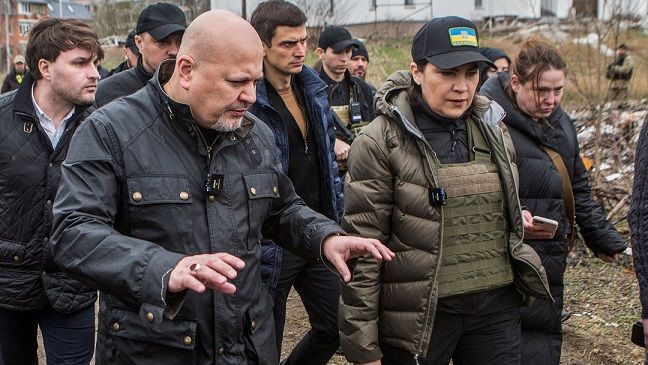The United Nations Security Council had an informal discussion on Wednesday to discuss the efforts being made in Ukraine to record claims of war crimes and crimes against humanity perpetrated by Russian troops, which are currently ongoing. Diplomats have said that evidence collecting is an essential first step toward prosecution and the delivery of accountability and justice.
A distinguished group of experts on human rights and war crimes — including the prosecutor for the International Criminal Court, the lawyer Amal Clooney, the United Nations’ top human rights official, and the director of Human Rights Watch — attended the meeting, which was organised by Albania and France at the United Nations and was attended by representatives from both countries. Ukraine’s prosecutor general attended the meeting through a video link from Kyiv, the country’s capital city.
Karim Khan, the International Criminal Court’s head prosecutor, said the crisis in Ukraine was a watershed moment in the history of justice and accountability. As Mr. Khan said, 43 nations had submitted the situation in Ukraine to the International Criminal Court – the highest number of referrals the court has received — and that the court had joined for the first time a combined investigative effort by Ukraine, Poland, and Lithuania.
Mr. Khan addressed the United Nations General Assembly gathering that “we must organise the law and put it into fight right now.” Not on the side of Ukraine against the Russian Federation, nor on the side of Russia against Ukraine, but on the side of humanity,” he says. ”
Khan emphasised that the court was independent and impartial, while also calling on Russia to cooperate with the court. However, he claims that his many efforts to engage with Russian officials have gone unanswered.
In spite of the swift and coordinated effort to gather evidence in Ukraine, experts believe that the establishment of war crimes trials and convictions, if they ever take place, would most likely take several years. According to analysts, Russia will very certainly refuse to make witnesses accessible or extradite anybody, much alone jail them.
According to Ms. Clooney, who works as part of an international legal team advising Ukraine on accountability, the council and the United Nations have failed to perform the function for which it was established: the prevention of war and the commission of crimes against humanity. She also criticised the council and the United Nations for failing to hold previous perpetrators of war crimes in places such as Darfur, Syria, and Myanmar accountable.
Mrs. Clooney described Ukraine as “today’s abattoir,” which is located “right in the heart of Europe.” “Can you tell me how we got here? “We got to this point by disregarding justice over a long period of time.”
In every meeting of the Security Council, Russia has asserted that its armed troops have murdered or tortured people, and has labelled such allegations as “false and lying.” In order to rebut the charges, Russia said it intended to hold its own informal council meeting on May 6 — the second such gathering that the country would have convened — with the participation of independent specialists.
Russian ambassador Sergey Leonidchenko said that the International Criminal Court was a “political weapon” that was “assigning guilt before a thorough inquiry was completed.”
As part of its criticism of the United States and Britain, which were co-sponsors of the meeting, Russia referred to them as “hypocrites” because they had either refused to sign on to the International Criminal Court or taken steps to protect their own military troops in Iraq and Afghanistan from being prosecuted by the court.
Iryna Venediktova, the Ukrainian prosecutor general, said that the crimes perpetrated by Russia in Ukraine were “colossal in type and scale,” and that there was a plausible foundation for the crime of genocide to be prosecuted against Russia.
The conflict, according to Ms. Venediktova, is also being investigated by 14 jurisdictions outside of Ukraine under a legal concept known as universal jurisdiction, which permits governments to pursue crimes that were not committed on their territory but that constitute crimes against humanity.
Since the beginning of the invasion, her agency has charged Russia of 6,400 acts of aggression and war crimes, as of April 14 this year.

